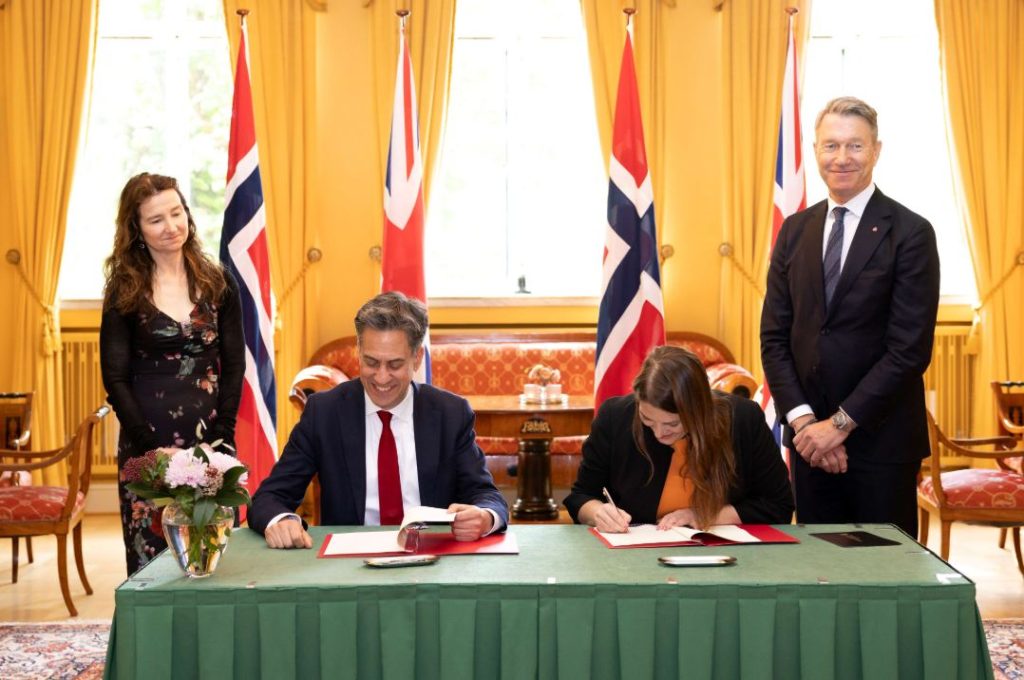Amid rising geopolitical and climate pressures, the United Kingdom has secured a Green Industrial Partnership with Norway aimed at accelerating the deployment of clean energy across the North Sea.
Signed during Energy Secretary Ed Miliband’s recent visit to Oslo, the agreement is positioned as a strategic move to strengthen both energy security and economic competitiveness by leveraging the region’s offshore wind, hydrogen, and carbon storage potential.
The agreement, signed with Norwegian Ministers Terje Aasland and Cecilie Myrseth and backed by Norway’s Prime Minister Jonas Gahr Støre, is framed as a key deliverable within the broader UK-Norway Strategic Partnership. It comes at a time when the UK is seeking to reposition itself as a clean energy superpower through initiatives that support grid integration, infrastructure resilience, and industrial decarbonisation. “Energy security is national security,” said Miliband, underscoring the UK’s effort to reduce dependence on volatile fossil fuel markets through international cooperation and domestic investment.
The UK government’s estimates suggest that the North Sea could provide up to 120 GW of offshore wind capacity by 2030—enough to power more than 120 million homes. The region also holds an estimated 78 billion tonnes of carbon dioxide storage potential beneath its seabed. Unlocking this capacity would not only support climate goals but also enable the development of cross-border CO₂ transport and storage value chains, especially as the UK and EU both ramp up their carbon management ambitions.
Beyond offshore wind and carbon storage, the partnership targets the development of hydrogen infrastructure, including green hydrogen production and export pathways. This aligns with the broader goals of both countries: the UK’s Plan for Change aims to stimulate clean energy manufacturing and jobs, while Norway sees the collaboration as a route to enhance value chains for clean energy technologies and raw materials.
Norwegian Energy Minister Terje Aasland described the agreement as “forward-looking,” citing the long-standing cooperation between the two countries in the energy sector. That legacy includes the deployment of interconnectors like the North Sea Link and shared innovation in subsea infrastructure, both of which lay the groundwork for an integrated clean energy future.
For Norway’s Minister of Trade and Industry Cecilie Myrseth, the agreement signals enhanced industrial cooperation. Corporate participation from major energy players is expected to amplify the partnership’s impact. Equinor, for example, is already deeply invested in the UK through offshore wind, hydrogen, and carbon capture projects. Statkraft, Fred Olsen, and Vårgrønn also hold significant UK renewables portfolios and are seen as natural partners in expanding cross-border clean energy infrastructure.
Research suggests the collaboration could deliver up to £36 billion in economic value to the UK, while creating approximately 51,000 jobs across sectors tied to clean power deployment, storage, and export. These gains are contingent, however, on regulatory coordination, investment incentives, and accelerated permitting—issues that both governments are under pressure to resolve as they scale up green infrastructure.
Stay updated on the latest in energy! Follow us on LinkedIn, Facebook, and X for real-time news and insights. Don’t miss out on exclusive interviews and webinars—subscribe to our YouTube channel today! Join our community and be part of the conversation shaping the future of energy.
